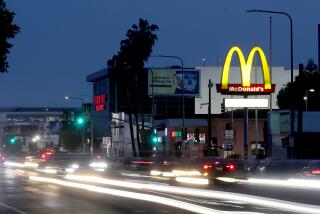Give states money to fight distracted driving? Congress ponders
- Share via
WASHINGTON -- Should Congress use scarce gas tax funds to try to coax states into cracking down on distracted driving?
That’s the question before the House, which will vote next week on whether to seek to keep $78 million in “legislative candy’’ out of a new transportation bill.
Under the Senate transportation bill, states would receive additional funds if they outlaw texting from behind the wheel, prohibit drivers under age 18 from using cellphones of any kind while driving and take other actions to combat distracted driving. The bill also would require states to spend a chunk of the money they receive on anti-distracted driving programs, such as beefed-up law enforcement targeting distracted drivers and advertising on the dangers of distracted driving.
Rep. Diane Black (R-Tenn.) is seeking to eliminate the incentive fund, calling it an effort at “federal manipulation of state law.’’
“I want safety on our roads,’’ she said on the House floor Thursday. But Congress, she said, could “make our roads safer by making sure that our roads and our infrastructure are in the best shape’’ instead of trying to entice states into passing anti-distracted driving laws as defined by Washington. She noted that 39 states are “already doing something related to distracted driving.’’
Her efforts have run into Democratic opposition.
Rep. Jason Altmire (D-Pa.) said the incentive grants are “an opportunity to address the rapidly growing problem of distracted driving.’’
States are “free to pass any distracted-driver laws they wish or not,’’ he said during a debate Thursday. While some Republicans, he said, “are skeptical of seemingly every federal program, we must avoid the temptation to eliminate programs without considering the real impacts they have on the lives of our constituents and on communities all across America.’’
The fight over $78 million in a $109-billion Senate-passed bill underscores the political potholes that have faced lawmakers in trying to reach agreement on a major transportation bill before the government’s authority to collect gasoline taxes and fund projects expires June 30.
The bill’s writing has been complicated by an 18.4-cent-per-gallon federal tax that isn’t bringing in enough money to maintain highway and transit spending at current levels, creating new fights over how funds are spent.
The anti-distracted driving money was included in the Senate bill in response to what John D. Rockefeller IV (D-W.Va.), chairman of the Senate Commerce, Science and Transportation Committee, called “a growing crisis in this country.’’
In 2010, 3,092 people were killed in crashes involving a distracted driver and an estimated additional 416,000 were injured in motor vehicle crashes involving a distracted driver, according to the National Highway Traffic Safety Administration.
Black has asked the House to instruct its negotiators on the transportation bill to seek to remove the incentive fund. She said she supports a study of distracted driving to “identify the most effective methods to educate drivers and enhance states’ understanding of these issues so that they can enact and tailor laws best suited to the individual needs of their states.’’
The Senate bill would provide financial incentives to states for requiring ignition interlock devices for DUI offenders and establishing graduated licensing programs that restrict teenagers’ driving privileges. But the current House GOP drive is aimed only at the distracted driving incentives.
ALSO:
Ice on the moon: Explorers may be able to raid ‘lunar freezer’
Video: George Zimmerman re-enacts encounter with Trayvon Martin
Bullied bus monitor: U.S. Marines have her back; Disneyland in her future
Richard.simon@latimes.com
More to Read
Sign up for Essential California
The most important California stories and recommendations in your inbox every morning.
You may occasionally receive promotional content from the Los Angeles Times.











